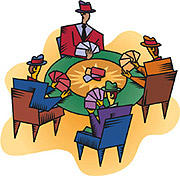Friday, October 07, 2005
Hit or miss?

I talked about slow playing in my previous poker post (say that 10 times fast!) but perhaps should have talked about what to do on the flop once all the raising (if any) and calling are finished. What makes poker such a wonderful game is that there are so many factors to take into consideration aside from what your hand is, including the number of players in the hand, draws, position, stack levels, etc. I'll try to give as much info as possible so you can consider how you would like to play your hand on the flop.
For the most part, you will be against just one person. The norm is someone raised, and one person will call; maybe two. Let's say you raised with Ace-King and the big blind called. The flop comes: King-Ten-Deuce. You hit your King. Your opponent checks to you. Now what? There are two choices:
a) Check, thinking you have the best hand and give your opponent the opportunity to bluff on the turn card.
b) Bet, usually a 1/2 pot-size bet or so, and win the hand right there. 90% of the time, I recommend betting. Why? Most players won't bet out if they don't have anything and you won't make any more money. And really, slow playing a pair isn't anything special (especially in this case where it isn't even a pair of aces) and can be outdrawn very easily. Betting also helps you in other ways:
1. It prevents your opponent from getting free cards. What if your opponent has a flush or straight draw? A lot of players don't bet on draws and will gladly take a free card if you check to them.
2. It tells you where you stand. If you bet, then are called, you may reason there are an a draw and are trying to make a flush for example. If you check, then they check, and you see a third diamond on the board on the turn, where are you? Do you still have the best hand now? Or perhaps your opponent was slow playing YOU and maybe they already made three of a kind. You have little information to make a decision.
3. The majority of the time, you win right there. If you hit top pair and bet, most of the time you will take the pot and build your stack. You'll have a reputation on the table as that of a solid player who plays good cards, and that will help you later on if you try to bluff.
4. Build the pot. Some players will call your bet in hopes of catching their Queen to make a straight or a spade to make their flush. If there's a card they need to get to win, make them pay for it.
Now what if you missed your flop? What if instead of a King, a Jack hit the flop (so the flop is now Jack-Ten-Deuce)? Now you only have Ace high. If you are first to act, again you have two options:
a. Check. You missed your hand and you don't want to lose any more money. Maybe if you check, your opponent missed the flop as well and they will also check and maybe you'll hit your Ace or King on the turn card. If they bet after your check, you're done with the hand and you will fold.
b. Bet. You showed strength before the flop by raising with your Ace-King. Your opponent doesn't know what you hold; for all they know maybe you raised with pocket Queens. Try betting here (this is called a Continuation Bet: you showed strength by raising pre-flop and you continued to show strength after the flop by betting) to steal the pot. Continuation bets are the most common form of bluffing in texas hold 'em. You should include this as part of your game but you cannot get away with this too often. If someone called your raise or raised you pre-flop, you should give them credit for holding something. You can burn up a lot of chips from your stack if you bet out on flops that you miss each time. Chances are if you missed the flop, they hit it. If you try a continuation bet and are simply called, another advantage is you may hit your Ace or King on the turn card and might be able to still win the hand. If you try a continuation bet and are raised, 99% of the time you should throw your hand away. It sucks that you had such a nice starting hand and now have nothing to show for it, but all it is at this point is Ace high if you didn't pair up your cards. The amount of your continuation bet should not differ from previous hands where you DID hit your flop. If you've been making bets 1/2 the size of the pot, continue to make a 1/2 sized pot bets here as well. You want to conceal the strength of your hand, and changing your bet size may arouse suspicion and your opponent may pick up on your bluff.
Subscribe to Comments [Atom]
